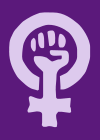Feminism in Nepal
Feminism in Nepal is primarily concerned with equity and equality of opportunity. Nepali society is traditionally highly patriarchal — it was not until 2007 that women under 35 could apply for passports without their father's or husband's permission. Feminists in Nepal seek to redress this situation. Most women in Nepal are considered to be beneath their husbands and fathers in a patriarchal society.
Much like western world women in the past, in Nepal, women are treated poorly in every aspect of their society, whether it is social, political, or economic; they have been avoided or mistreated.
Statistics from Violence Against Women,[1] a website dedicated to raising awareness as well as finding solutions to present day issues, highlight these inequalities:
- 77 percent of the episodes of violence against women are reported as being from within the family.
- 22 percent of women aged 15 to 49 have experienced physical violence at least once since age 15.
- 43 percent of women have experienced sexual harassment in the workplace.
- Between 5,000 and 12,000 girls and women are trafficked every year. 75 percent of them are below 18 years of age and the majority are sold into forced prostitution.
Women who made a difference for Nepal
One of the few women who have made a great impact on Nepal's feminist movement is Simon de Beauvoir, with her book The Second Sex. Such strong-willed writing helped remind most Nepali women of their rights as citizens.[2]
History
The first feminist organization in Nepal was the Nepal Woman Association, which was started under the leadership of Mangala Devi Singh.
In August 2009, there was a protest in Kathmandu, in response to the government's decision to give $650 cash to single Nepali women in exchange for getting married. They called this march the "government sponsored dowry".[3]
Achievements
- After the lobbying of various organisations and feminist groups, 33% seats are reserved in every committee and group starting from the grassroots level up to the legislative of Nepal. However, these reservation policies are not currently being enforced.
- Government grants subsidy on tax while registering property in the name of women to improve the access of women on property.
- Women are allocating and reserving 33% seats on every possible programs from scholarship to government jobs to increase the participation of women.[2]
- There are specific grammar problems within the language of Nepal, specifically toward women. Towards the mid-20th century, that began to change due to the feminist movement, which took notice of these words being used. Most of the language consisted of sexist words to describe women, while men were described with positive words. However, the sexism towards women is slowly changing as the times change for Nepal.[2]
Organisations
- ABC Nepal is a non-governmental, non-profit organisation based in Kathmandu with regional offices in Bhairahawa and Biratnagar. It has been working since 1987 to empower women, raise the status of women through gainful employment opportunity, and promote vocational training and leadership development for women. It focuses on anti-trafficking campaigns.
- Maiti Nepal
- Forum for Women, Law and Development
- Sancharika Samuha
- Shakti Samuha
- Women LEAD is a non-governmental organization based in Kathmandu that provides women's leadership development training and advocacy in Nepal.
- Women Rehabilitation Centre (WOREC Nepal) is a non-governmental organization, non-profit organisation based in Kathmandu with regional offices across the countries. It was established in 1991 as a movement based organization that functions with the premise of women rights and social justice as a prerequisite for peace, social justice and sustainable development. From over 26 years, WOREC has established itself as leading national organization that works to prevent violence against women, its causes and consequences, ensure its economic, social cultural well-being of women as well as other marginalized groups by promoting their access to rights and social justice. that provides women's leadership development training and advocacy in Nepal.
References
- ↑ Violence Against Women
- 1 2 3 Mira Pokhrel (2011). "Effects of Feminism in Honorificity and Gender Domination in Nepali Pronouns" (PDF). CET Journal. 3 (1): 30-.
- ↑ http://search.proquest.com/docview/212366878/
